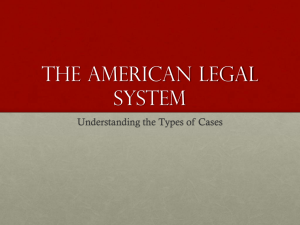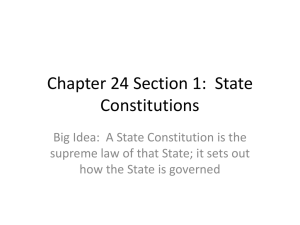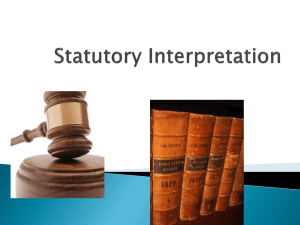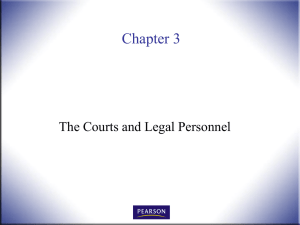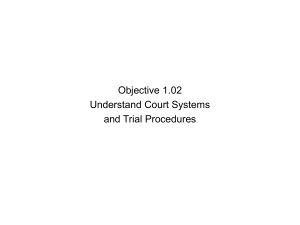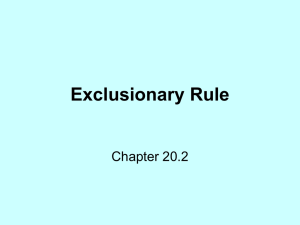Chapter 4 THE COURT SYSTEM
advertisement
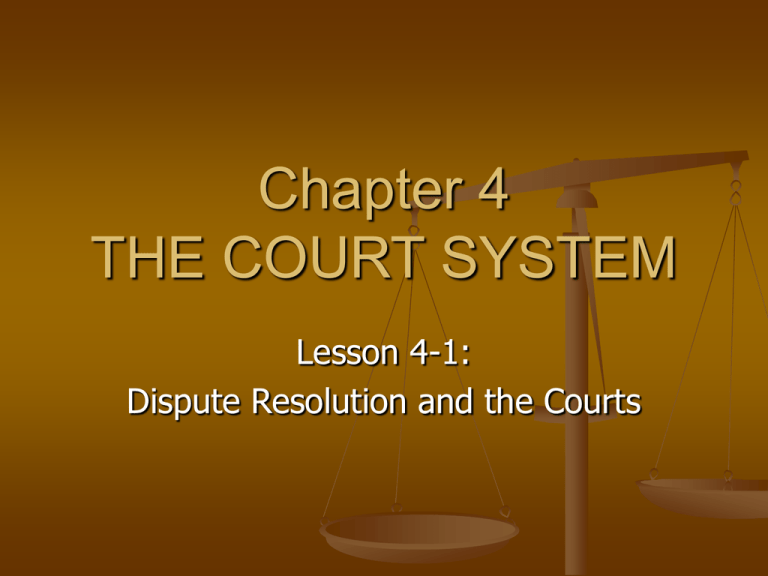
Chapter 4 THE COURT SYSTEM Lesson 4-1: Dispute Resolution and the Courts Resolving Disputes Privately Litigate – take disputes to court Mediator – independent third party who tries to develop a solution acceptable to both sides of the dispute Decision does not bind the parties Arbitrator -- third party who holds an informal hearing to determine what happened Decision is binding, can be enforced by court order Different Levels of Courts Court – a governmental forum that administers justice under the law Follows impartial and thorough procedures to make decisions 2 Levels of Courts: 1. Trial Courts – first court to hear a dispute original jurisdiction – authority to try the case the first time it is heard Judge, witnesses, clerks, sheriff or marshals, bailiffs and jury members 2. Appellate Courts – reviews decisions of lower courts when a party claims an error was made in previous proceedings Trial Court Participants Witness – testify about trial Lawyers – officers of the court Juries – decide issues of fact Clerk – keeps calendar, records proceedings, and computes court costs Sheriffs (or deputies) – serve as bailiffs (in state courts) summons witnesses, keep order in court and carry out judgments. At Federal Level – Marshalls Appellate Courts Panel of 3 judges do not hear witnesses generally do not accept new evidence concerned with error of law rather than questions of fact Appellate courts examine the transcript (verbatim record of what went on at a trial) Read appellate briefs (written arguments on the issues of law) Decide if decision of lower court will be: 1. affirmed (upheld) 2. reversed (overturned) 3. amended (changed) 4. remanded (sent back to trial for corrective action or new trial) Chapter 4 THE COURT SYSTEM LESSON 4-2: Federal Court System 3 Levels of Federal Courts 1. Federal District Courts 2. Federal Courts of Appeals 3. U.S. Supreme Court 3 Levels of Federal Courts (Cases involving Federal Law) UNITED STATES SUPREME COURT 13 U.S. COURTS OF APPEALS (12 Circuit Courts) (1 Court of Appeals for the Federal Circuit) STATE SUPREME COURTS U.S. DISTRICT COURTS SPECIALIZED FEDERAL COURTS* MANY FEDERAL AGENCIES *Specialized Federal Courts – Tax Court, Court of International Trade, Claims Court Jurisdiction Power of a court to decide a case Original jurisdiction – authority to try the case the first time it is heard General jurisdiction – authority to hear almost any kind of case Special jurisdiction -- authority to hear only one specific type of case Small Claims – Bankruptcy Court Appellate jurisdiction – authority to decide an appeal Jurisdiction of the Federal District Courts Hear cases involving: page 55 Federal questions or cases that arise under the Constitution, U.S. Law, and U.S. treaties Lawsuits between citizens of different states Lawsuits between U.S. citizen and a foreign nation Lawsuits between U.S. citizen and a foreign citizens These parties have diversity of citizenship Must be more than $75,000 to be heard in federal courts Less than $75,000 – case should be heard in state court 1. Federal District Courts -- Lowest level of court with general jurisdiction Trial court of the federal system – first court to hear case 2. Federal Courts of Appeals 13 Federal Courts of Appeals Appellate jurisdiction over the district court – can hear appeals from this court 3. United States Supreme Court -- Highest court in the land Both original and appellate jurisdiction Original jurisdiction – cases affecting ambassadors, public ministers and consuls Appellate jurisdiction -- hears appeals from U.S. Court of Appeals and other high courts of various states Writ of certiorari – an order that compels the state court to turn over the record of the case Chapter 4 THE COURT SYSTEM LESSON 4-3: State Court System Structure of State Court Systems State Trial Courts – Original and general jurisdiction Court of Record – keeps an exact account of what goes on at trial. State Court of Appeals – panel of 3 judges review case State Supreme Courts – Appellate and original jurisdiction Issue final decision unless federal issues or U.S. constitutional issues Justice – the judge who sits on state supreme courts State Court System SUPREME COURT INTERMEDIATE APPEALS COURT TRIAL COURT (Original, General Jurisdiction) FAMILY COURT JUVENILE COURT MUNICIPAL COURT JUSTICE’S COURT (Justice of the Peace) PROBATE COURT SMALL CLAIMS COURT CRIMINAL COURT State Courts with Specialized Jurisdiction 1. Associate Circuit Courts or County Courts – hear minor criminal cases, state traffic offense and lawsuits with small amounts involved. 2. City or Municipal Courts – divided into traffic and criminal divisions; hear violations that occur within city limits 3. Small Claims Court – handles disputes in which small amounts, general $2,500 or less, are involved. 4. Juvenile Courts – hear disputes involving juveniles emphasis on rehabilitation not punishment 5. Probate Courts – administers wills and estates




